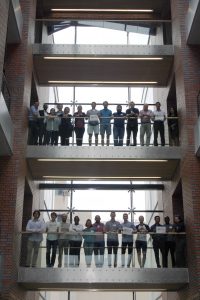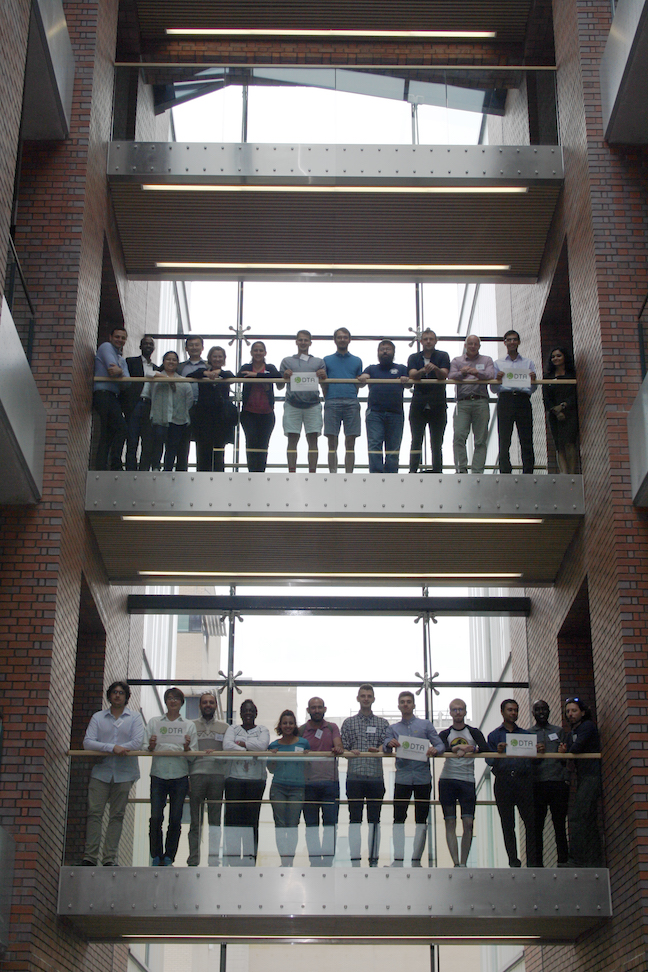
DTA Energy students touring the Energy Centre and combined heating plant at Kings Cross
In October of this year I was appointed as the National Director for University Alliance’s Doctoral Training Alliance (DTA) programme. In my application for the role I had reflected on my own experience as a PhD student and on my institutional experience of leading on postgraduate research (PGR) provision and support. I completed my PhD in the 1980s, so years before the Vitae RDF Framework or even the Roberts review: ‘SET for Success’ (that does really take me back!) Nevertheless, I was blessed with a superb PhD supervisor who supported and intellectually stretched his PhD students and who taught me what it is meant to be a good supervisor.
As I progressed in my career I did not plan to take on a specific leadership role but, sometimes, all it takes is an event to become a trigger for you to act. And this is what I did. I had joined the institution I was working at quite recently and I heard someone in the corridor crying and very upset. I invited her to my office and started to talk to her. She was a mature, part-time, British student who was living and working in the US and doing her PhD. In this prearranged visit she was hoping to meet her supervisor to talk about the structure of her thesis and, on arrival, she found out that her supervisor had recently left the institution and no one, including the supervisor, had told her anything. This is when I decided to become my school’s Research Degree Co-ordinator. Fast forwarding a few years, this role took me to take the lead for PGRs in my Faculty, then across the university. This involved instigating the first institutional review of PGRs and led to the establishment of a – now thriving – Graduate School. I can guarantee that no one there will have a similar experience to that student whom, incidentally, I decided to supervise during her write up and is now a very successful international author.
 For me, it is pure and simple: PGRs are the lifeblood of research at HEIs. They represent the highest qualification anyone obtains and, whilst a small proportion stay in academia, many leave the sector to achieve great things. In the past two decades there has been a strong emphasis on the experience they gain whilst conducting their PhDs to prepare them for a wide variety of roles across society. We have also seen the birth of RCUK’s Doctoral Training Centres/Partnerships (DTCs/DTPs). The early rounds of these DTCs/DTPs by and large excluded universities whose missions were broader than research intensity yet had excellent records for producing superb PGRs with excellent impact and pockets of research excellence. With the second round of DTPs/DTCs, thankfully there appears to be a commitment to greater diversity and inclusiveness. The ESRC DTPs announced in 2016 are, indeed, a good example of this. So I am cautiously optimistic that other Research Councils (which will soon sit within UKRI) will do the same.
For me, it is pure and simple: PGRs are the lifeblood of research at HEIs. They represent the highest qualification anyone obtains and, whilst a small proportion stay in academia, many leave the sector to achieve great things. In the past two decades there has been a strong emphasis on the experience they gain whilst conducting their PhDs to prepare them for a wide variety of roles across society. We have also seen the birth of RCUK’s Doctoral Training Centres/Partnerships (DTCs/DTPs). The early rounds of these DTCs/DTPs by and large excluded universities whose missions were broader than research intensity yet had excellent records for producing superb PGRs with excellent impact and pockets of research excellence. With the second round of DTPs/DTCs, thankfully there appears to be a commitment to greater diversity and inclusiveness. The ESRC DTPs announced in 2016 are, indeed, a good example of this. So I am cautiously optimistic that other Research Councils (which will soon sit within UKRI) will do the same.
Whilst we will continue engagement with the Research Councils’ DTPs as individual or group of institutions I am delighted that, through collective actions and building on the research strengths and industry-focused ethos of Alliance universities, we have set up our own Doctoral Training Alliance. The DTA is the largest multi-partner and the only nationwide doctoral training initiative of its kind, responding directly to the needs of industry. The primary objective of the DTA is to produce independent, highly employable researchers with knowledge, expertise and skills in the strategically important research areas of Applied Biosciences for Health, Energy and – most recently – Social Policy.
The focus of this, our newest DTA is on innovative research methods; supporting researchers in policing, healthcare, psychology, criminology, sociology, social care, social justice and social policy to use and develop cutting edge methodologies that are emerging from the rapid changes in data and technology.
As my story above illustrates, it is vital that opportunities for doctoral study are open to the broadest possible pool of talented researchers, including mature learners and those studying who need to do so flexibly to balance family or caring commitments. I’m proud that our cohorts include individuals who are studying part time, and from a wide range of background – both from the UK and internationally.
The DTAs currently provide an enhanced cohort training environment for 130 students and provide associated research collaboration opportunities for more than 250 supervisors. Students are offered international mobility and/or industry placement opportunities. Each of the DTAs takes a deliberately multidisciplinary approach to tackling some of the biggest challenges facing society including ageing, sustainably meeting our future energy needs and supporting health and wellbeing for all. This encourages divergent thinking and the breaking down of traditional silos.
The success of these DTAs reflects the tremendous commitment and hard work by national theme directors, their deputies, the supervisor community and the DTA team at UA. So, as the new National Director, I am privileged to be able to build on and contribute to this wonderful initiative and to work to ensure its sustainability.
Each DTA has a group of external advisors made up of leading figures from practice, industry and policymaking, providing guidance, support and challenge.
My priorities for the next two years will be the internationalisation agenda and the development of strategic partnerships which will enhance all our students’ experiences and strengthen our research capacities. I will also focus on further embedding industrial engagement throughout the DTAs.
I had my first meeting with University Alliance’s DTA team last week and I know I will enjoy working with them. Over the coming months I am eagerly looking forward to meeting the wider academic leadership team across the DTA and, of course, the supervisors and the students.
We are going to have a blast!




